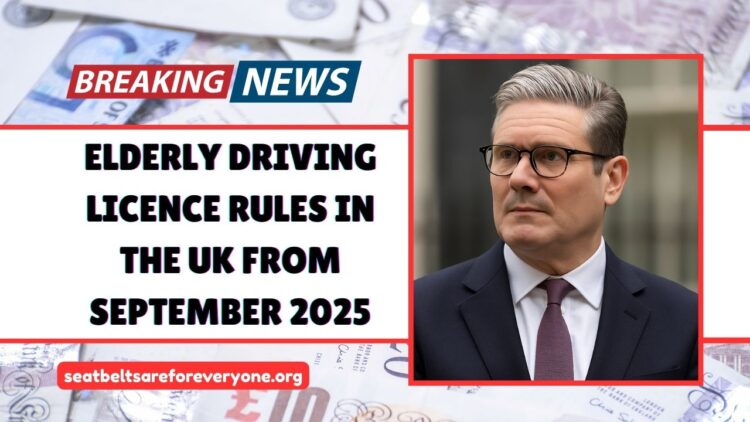For many elderly drivers in the UK, holding a driving licence is not just about legal compliance—it represents independence, mobility, and freedom. However, from 1 September 2025, new rules will come into effect for drivers aged 70 and above. These updates aim to balance road safety with independence, ensuring older motorists can continue driving while being fit to do so.
Key Changes to Driving Licence Rules from September 2025
The Driver and Vehicle Licensing Agency (DVLA) has confirmed the following changes:
- Licence renewal period reduced: Drivers over 70 must now renew their licence every three years, instead of every five.
- Medical self-declaration required: Each renewal will include a declaration of medical fitness to drive.
- Eyesight checks: Some drivers may be asked to provide proof of a recent eye test, especially if the DVLA has concerns or reports about vision.
These changes were recommended by road safety experts and medical professionals, highlighting the need to monitor age-related health conditions more frequently.
Why the Rules Are Changing
As people age, natural changes in vision, reaction times, and overall health can impact driving ability.
- Health risks: Conditions such as diabetes, strokes, cognitive decline, or poor eyesight can make driving more dangerous.
- Safety advocates: Families, doctors, and campaigners pushed for more frequent assessments to protect both elderly drivers and other road users.
- Policy goal: The new system aims to spot issues earlier, allowing drivers to access support where needed while making UK roads safer.
Who Will Be Affected
The new rules will apply to:
- All drivers turning 70 on or after 1 September 2025.
- Current drivers over 70 renewing their licence after this date.
- Any driver of any age with medical conditions affecting driving—such as epilepsy, severe vision problems, or neurological disorders—who must report to the DVLA.
Drivers under 70 will remain under the current renewal system, unless their health condition requires more frequent checks.
How to Renew Your Licence
The DVLA has streamlined the renewal process to make it simple and accessible.
| Step | Details |
|---|---|
| Online Renewal | Visit the DVLA website, use licence details, NI number, and UK passport. |
| Postal Renewal | Paper forms available for those not using online services. |
| Medical Declaration | Confirm fitness to drive and declare any notifiable health conditions. |
| Eyesight Test (if required) | Provide proof of a recent test if requested by the DVLA. |
| Renewal Timeline | Complete renewal early to avoid expired licence penalties. |
Driving with an expired licence is a criminal offence, carrying fines and invalidated insurance.
What This Means for Over-70 Drivers
For most healthy elderly drivers, the new process won’t pose major challenges. Many already schedule regular GP and optician check-ups, so the updated rules simply formalise an existing routine.
However, drivers with ongoing conditions should consult their GP before submitting medical declarations. Failure to disclose a notifiable condition can lead to:
- Fines of up to £1,000.
- Insurance invalidation.
- Potential disqualification from driving.
Benefits of the Updated Rules
Although some see these changes as stricter, they are ultimately designed to support elderly drivers.
- Safer roads: More frequent checks help reduce accidents linked to health issues.
- Early detection: Identifying medical concerns sooner allows drivers to seek treatment and remain safe behind the wheel.
- Peace of mind: Families can feel reassured knowing their loved ones are driving responsibly.
The DVLA emphasises that these updates are not meant to penalise older drivers, but to help them stay on the road safely for longer.
Tips for a Smooth Renewal Process
- Keep your details updated: Ensure your address and contact information with the DVLA is correct for renewal reminders.
- Book regular check-ups: Maintain GP and optician appointments to have up-to-date records.
- Prepare documents early: Have your medical declaration and eyesight records ready before applying.
- Apply in advance: Begin the renewal process early to avoid driving with an expired licence.
The new elderly driving licence rules starting September 2025 mark an important change for UK drivers over 70. With renewals required every three years, mandatory medical self-declarations, and potential eyesight checks, the system is designed to improve safety while protecting independence.
For most older motorists, these rules will not be a barrier but a reassurance that they are fit to drive. By staying compliant, over-70 drivers can continue enjoying the freedom of the road while contributing to safer communities across the UK.
FAQs
From 1 September 2025, elderly drivers must renew every three years, instead of every five.
All renewals will require a medical self-declaration. In some cases, the DVLA may request an eye test or further checks.
Driving without a valid licence is illegal, carrying fines up to £1,000 and invalidating your insurance.

